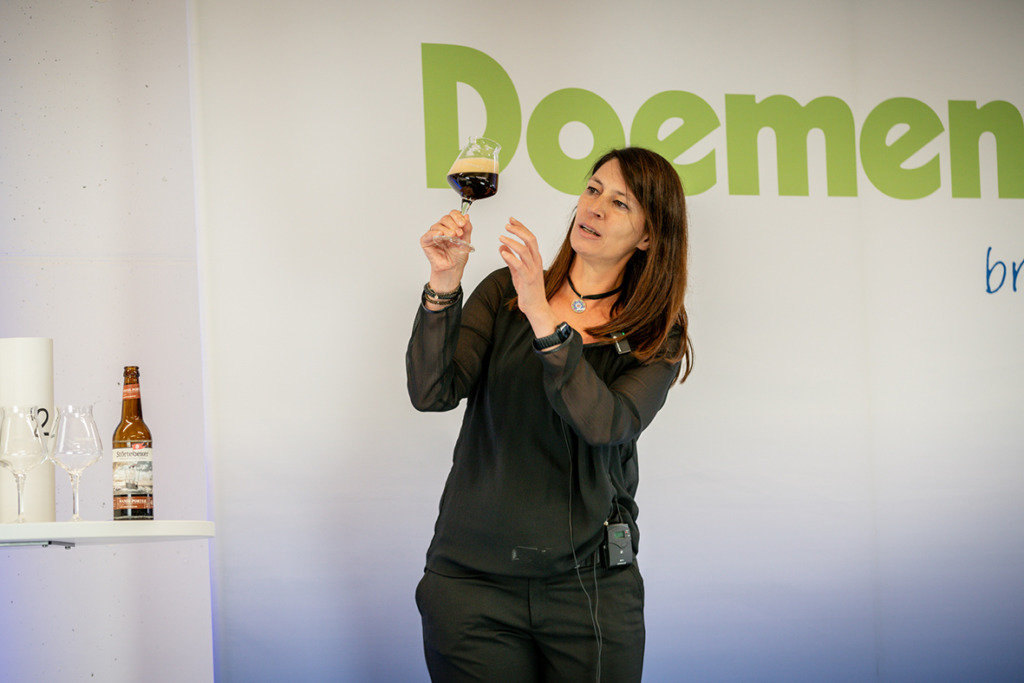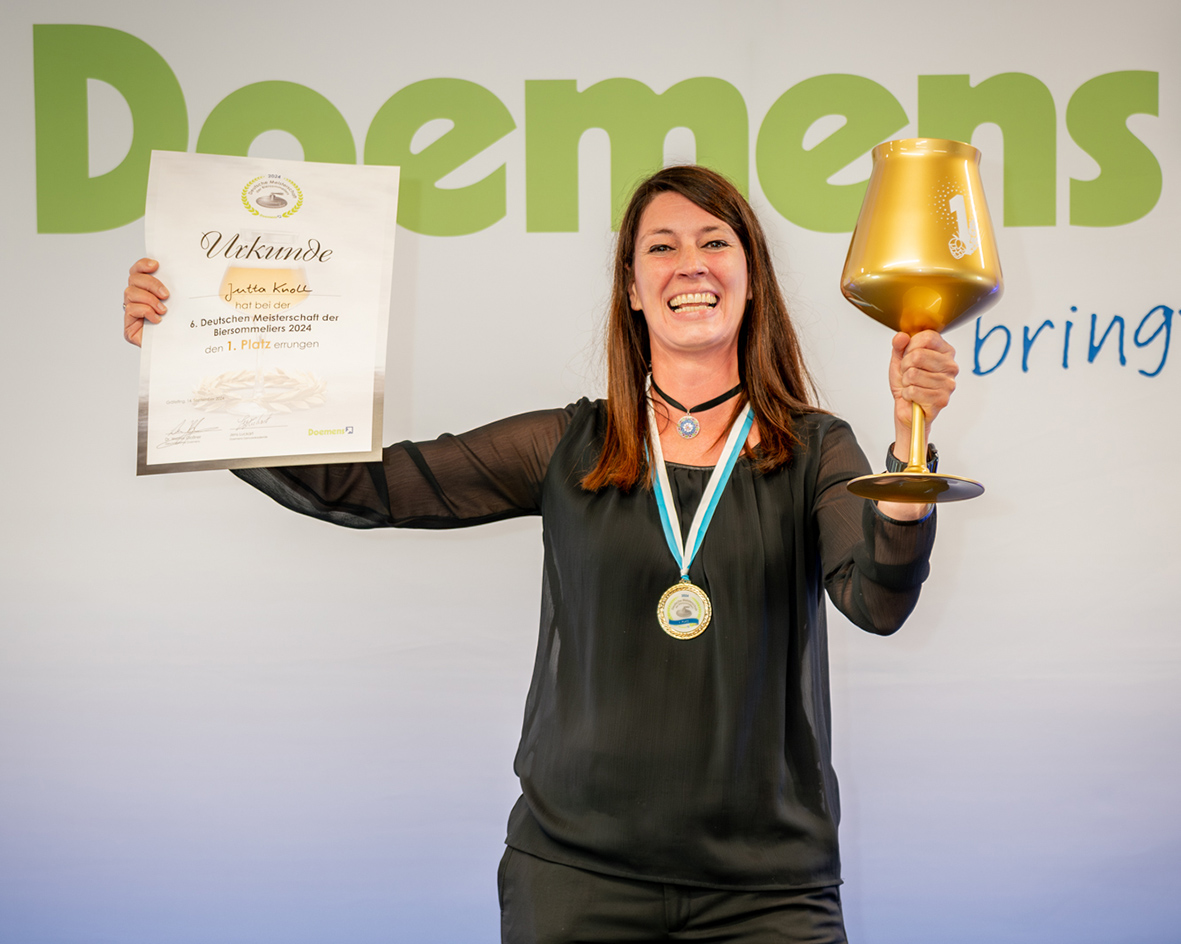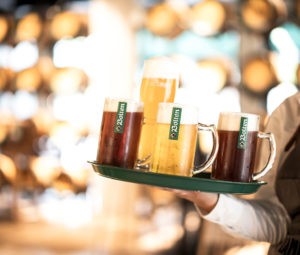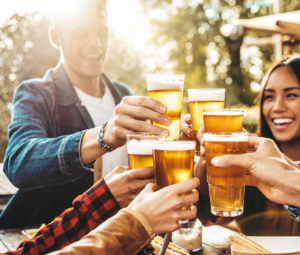The Path to Beer: A Passion Becomes a Profession
Ms. Knoll, how did you first get involved with beer?
I spent the last four years of school in Belgium, where beer plays a very special role. Fruit beers with a low alcohol content are very popular there, and they made it easy for me to get into the subject. The culture there showed me early on how diverse beer can be. But I also spent some time in Bavaria, which offers a completely different yet wonderful beer experience. At some point, my husband and I started brewing beer at home. It became a shared hobby that brought us a lot of joy. Eventually, I decided to pursue a Beer Sommelier certification to deepen my knowledge.
Professionally, I originally studied business administration and later worked at Telekom, including in communications. This combination of business knowledge and communication skills provided the perfect foundation to start my own business in the beer industry. Beer is not just a passion, but for me, it’s also a serious business where one can definitely earn a living.
The German Beer Sommelier Championship: A Major Success!
 Jutta Knoll presents the Hanse-Porter at the German Beer Sommelier Championship ( Picture: Doemens)
Jutta Knoll presents the Hanse-Porter at the German Beer Sommelier Championship ( Picture: Doemens)
Ms. Knoll, you’ve just won the German Beer Sommelier Championship. Congratulations! What does this title mean to you?
Thank you very much! For me, this title is a great honor and a wonderful recognition of my work. The German Beer Sommelier Championship is a chance to showcase my knowledge of beer, the variety of aromas, and the stories behind them. I want to inspire people to see beer not just as a drink, but as a real experience.
What can you tell us about the German Beer Sommelier Championship and its significance for beer culture in Germany?
The German Beer Sommelier Championship at the Doemens Academy in Gräfelfing is a demanding competition that involves much more than just tasting beer. It’s a combination of knowledge, sensory skills, and communication. You need to know the breweries, their stories, and their traditions to convey the passion that goes into every beer. In the final round, we had to present a randomly selected beer style in a spontaneous, multi-minute presentation. I drew the Hanse-Porter from Störtebeker Brewery, which was fantastic. Porter beers have always fascinated me, so I was able to share historical facts and background information as well. It’s precisely these stories that give beer a different level of appreciation. I had a great time. Overall, this German Championship is an excellent platform to enhance the appreciation of beer and to demonstrate how diverse the beer world truly is.
Non-Alcoholic Beers: A Growing Trend
What trends do you currently see in the beer market?
One trend that stands out is the growing market for non-alcoholic beers. Consumers are becoming more health-conscious, and many people want to enjoy consciously without sacrificing flavor. Non-alcoholic beers offer an excellent alternative, and the quality in this segment has improved tremendously in recent years. There is now a variety of styles, from pilsners to IPAs, available in non-alcoholic versions without compromising on taste.
Regionality and Natural Ingredients Are Becoming Increasingly Important!
You often talk about the importance of regionality and connection to nature. What does that mean for beer?
I believe that regionality and the connection to natural ingredients play a crucial role. When you know where the beer comes from, which brewers made it, and which raw materials were used, you develop a completely different relationship with the product. Authenticity matters – knowing that you’re holding something local, handmade, and created with love. Consumers can sense this naturalness and quality.
Storytelling Through the Minikeg!
 picture: Nina Schöner fotographie
picture: Nina Schöner fotographie
To what extent does storytelling play a role in the success of beers?
Storytelling is incredibly important, especially when it comes to the lifestyle that beer conveys. The look, the design of the bottles and cans, but also the stories a brand tells, influence how the beer is perceived. Some examples include Veltins’ “Pülleken” or “Schreckenskammer” Kölsch, brewed by Früh Brewery. Gaffel, with its “Sonnenhopfen” and its various campaigns, has also implemented this wonderfully. Maisel expresses a unique lifestyle through the artworks on its Artbeer bottles.
Then there’s the Minikeg. A party keg represents sociability, celebration, and beer as something special. It’s not only a practical solution for parties but also a large advertising space, perfect for storytelling. Tapping from a Minikeg is an experience in itself – you feel like your own bartender, and that’s just fun!
The Winner of the German Beer Sommelier Championship Advises: Embrace More Variety!
What advice do you have for breweries to better position themselves in the market?
I think variety is key and should be used more in Germany. Internationally, this is often done better – there is a broader range of styles and varieties actively offered in the hospitality industry. In Germany, consumers are often very price-sensitive, which also affects the variety offered. It would be great if more breweries had the courage to offer different beer styles and if the hospitality industry opened up to introduce consumers to this diversity. Because only when people get to know the beers can they discover their love for them.
What about craft beer? The term has lost significance in recent years.
That’s true. The term “craft beer” often has a negative connotation in Germany. Perhaps we should talk more about “specialty beers.” This term brings more appreciation and puts the focus on quality. Ultimately, it’s about giving beer the status it deserves. In countries like the USA or France, there’s more awareness of this – there, people are willing to pay $8 for an IPA in a restaurant. That reflects the appreciation for the product, and I think that’s an important step for Germany as well.
Do you have any final advice for brewers?
Yes, I think it’s important not to shy away from charging higher prices for special beers. Germany is a price-sensitive market, but high-quality food products have their price – and beer is a food product! I would also advise brewers to show consumers what a fantastic product they’re creating. It’s an honor to work in this industry and to create something with so much passion that brings people together and brings joy.
Ms. Knoll, thank you for the inspiring conversation!
Thank you! It’s very important to me to continue promoting the appreciation of beer in Germany and to thank the brewers for their great work. It’s a wonderful profession, and I hope that together we can inspire many more people for the world of beer.
Cover Photo: Doemens



